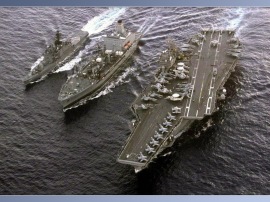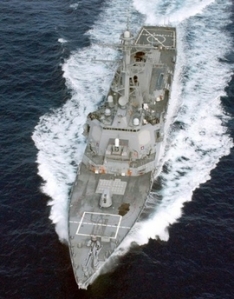Costa Ricans Massively against U.S. Military Invasion
August 16, 2010 1 Comment
By Luis R. Miranda
The Real Agenda
August 16, 2010
In the latest survey released by a Costa Rican polling firm, it is confirmed that most of Costa Rica does not welcome on arrival and permanence of U.S. troops in their country. In recent weeks, the Congress of Costa Rica agreed to allow the arrival of military ships, planes and thousands of American marines to ‘aid’ in the war against narcotics trafficking in the Americas, which is largely driven by the U.S. and Colombia. 
In the survey, whose partial results were published in a local newspaper, Costa Ricans expressed unfavorable views of the U.S. occupation. Of all respondents, 32 percent believe that the occupation is detrimental. The newspaper did not explain why, or if polled respondents were questioned as to why their opinion was such. Meanwhile, another 38 percent of respondents expressed concern that the arrival and permanence of Americans violates Costa Rican sovereignty.
Overall, 70 percent of ‘Ticos’ demonstrated their dissatisfaction with the arrival and permanence of foreign troops until December 2010. But it is the 38 percent number that sounds the bell, more than any other number. The reason is that more than one third of Costa Ricans are aware that the U.S. invasion is a violation of their sovereignty, a position that until a few weeks ago was unknown. Thus, the 57 per cent who welcomes the country’s militarization pales in comparison to the 70 percent who disapproves -32 percent who see as harmful the arrival of the Americans and the 38 percent who disapprove due to the violation of sovereignty.
Although the majority of Costa Ricans disapprove the arrival of the Americans, for the reasons mentioned above, 57 percent approval makes it clear that there is considerable support. The reason for the support, although not explained in the publication, can be easily be connected to the insecurity that the ‘Ticos’ experience daily in their neighborhoods and cities. The insecurity has been allowed to grow freely for several decades by many governments that believed the fallacy that Costa Rica was the Switzerland of Central America and that nothing would change that. Years later, the underworld, the drug lords, both locals and from abroad, gained control of the streets in the country. Drug cartels now control large areas in southern, northern and the Caribbean regions. The failure of a bureaucracy that purposely let crime grow out of control, now presents the militarization as a solution with the arrival of 7,000 troops, warships and military aircraft and helicopters, which is seen as an exageration and a threat to the sovereignty of Costa Rica. But this is not new. It is the well known modus operandi and Hegelian practice of problem, reaction, solution.
In fact, the cooperation agreement between Costa Rica and the United States did not improve at all the drug trafficking situation in the country. During the execution of this agreement, more and more drugs continue moving through Costa Rican land and waters to their northern destinations of Mexico and the United States. In South America, the treaty known as Plan Colombia did not resul in anything positive, either. Millions of dollars of U.S. taxpayers are ‘invested’ in a war regarded as a failure because it has failed to accomplish its only goal: ending the drug trade in South, Central and North America, where the largest consumer market of cocaine, crack, heroin and other drugs -made in clandestine laboratories with mixtures of pharmaceutical ingredients- is located.
In response to growing drug trafficking, the U.S. pursued a policy of ‘cooperation’ that includes the invasion of sovereign territories to supposedly stop the flow of drugs across the continent, but neither the navy nor the army, -under the guidance of the Southern Command (SOUTHCOM )- scattered across the continent have achieved that goal. People have to wonder why.
The results so far provided by the pollster UNIMER, not only reveal the overwhelming opposition of the people in Costa Rica to the occupation, but also the fatigue of the ‘Ticos’ to the ‘business as usual’ policy of their government. Although the new president arrived with great fanfare, as they all arrive, she was not able to recognize the lack of leadership from the previous governments and project a clear plan on what to do about insecurity in the country. Mrs. Chinchilla preferred to extend the policy of accepting gifts and even sacrifice the sovereignty of Costa Rica to participate in a drug war that has proved a complete failure due to the fact it is driven by corruption and not by a desire to end the drug trafficking scheme.
Another conclusion that emerges from the survey is that 57 percent of ‘Ticos’ who support military intervention ignore the failure of the current war on drugs, which is largely responsible for the bankruptcy of the United States. The policy of occupation emptied the coffers of the government, which in itself did not even have any money. Similarly, history shows that countries who sacrifice freedom and sovereignty in exchange for ‘security’, end up losing both. What this 57 percent should demand is a clear policy against crime, not the acceptance of royalties. Although the democratic system is a hedious one, as it subjects large amounts of citizens to the wishes of others, hopefully in the case of Costa Rica the voice of the majority, -which this time seems to be wiser than before- will be heard louder than ever, to wake up the minority from their sleep in the arms of ignorance.
Related Articles:
Costa Rica Occupied by U.S. Military *UPDATE*
Costa Rica Occupied: Congress Surrenders Sovereignty to U.S. Army
HSBC, Wachovia, Bank of America Launder Mexican Drug Money

